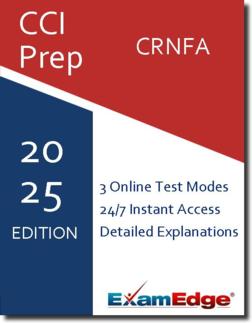CCI CRNFA (CRNFA ) Practice Tests & Test Prep by Exam Edge - Blogs
Based on 20 Reviews
- Real Exam Simulation: Timed questions and matching content build comfort for your CCI CRNFA test day.
- Instant, 24/7 Access: Web-based CCI Certified Registered Nurse First Assistant practice exams with no software needed.
- Clear Explanations: Step-by-step answers and explanations for your CCI exam to strengthen understanding.
- Boosted Confidence: Reduces anxiety and improves test-taking skills to ace your CCI Certified Registered Nurse First Assistant (CRNFA ).



